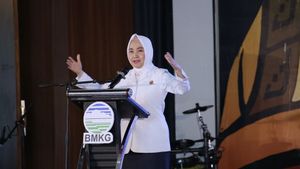Coordinating Minister for Economic Affairs Airlangga Hartarto explained that the government has increased the quota of housing financing liquidity facilities (FLPP) to Low-Income Communities (MBR) from the original target of 166,000 units to 200,000 units.
"The government also encourages FLPP, where for low income communities, FLPP is from the original target of 166,000 units, increased to 200,000 units," he explained at a press conference, Tuesday, August 27.
According to Airlangga, the housing sector is one of the government's priorities because it is one of the second largest expenditures after food and drinks for the middle class.
Therefore, Airlangga hopes that this policy is expected to encourage the ability of the middle class to encourage the consumption sector.
"We know that the construction and housing sectors have a high effect of multipliers," he explained.
Airlangga explained that the food and beverage sector was the largest expenditure and was followed by the housing sector as the second largest expenditure.
"Residence is a priority, this is one of the second largest expenditures and after food and drinks. So for the middle class, this housing sector is important," he added.
Airlangga explained that the government will continue to maintain and encourage the middle class of the economy, because it has a strategic role to support the economy, especially related to entrepreneurship and job creation.
"Of course investment is important, positive investment, and this will certainly make social changes, especially to achieve Indonesia's gold 2045," he said.
Therefore, Airlangga said the government would continue to maintain the middle class so that it could encourage stable and high economic growth.
SEE ALSO:
"Because this will encourage classes to encourage our middle class to continue to grow and reduce those who are middle class or the decline from the middle class itself," he said.
Airlangga conveyed that to support the middle class, the government has launched several programs, including social protection programs, tax incentives, pre-employment cards, job loss guarantees, recipients of health insurance contributions, and people's business loans.
"These various programs are expected to hold back the number of middle class," he said.
The English, Chinese, Japanese, Arabic, and French versions are automatically generated by the AI. So there may still be inaccuracies in translating, please always see Indonesian as our main language. (system supported by DigitalSiber.id)













